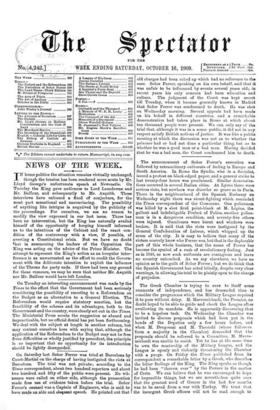On Saturday last Senor Ferrer was tried at Barcelona by
Court-Martial on the oharge of having instigated the riots at Barcelona. The trial was not private; according to the ' Times correspondent, about two hundred reporters and about two hundred and fifty of the public were present._ No wit- nesses were called on either side, although the prosecution made free use of evidence taken before the trial. Senor Ferrer's counsel_ was a Captain of Engineers, who is said to have made an able and eloquent speech. He pointed out that old charges had been raked up which had no reference to the case. Senor Ferrer, speaking on his own behalf, said that it was unfair to be influenced by events several years old ; in recent years his only concern had been education and culture. The judgment of the Court was kept secret till Tuesday, when it became generally known in Madrid that Senor Ferrer was condemned to death. He was shot on Wednesday morning. Several appeals had been made on his behalf in different countries, and a remarkable demonstration had- taken place in Rome at which about ten thousand people were present. We can only say of the trial that, although it was in a sense public, it did not in any respect satisfy British notions of justice. It was like a publie meeting at which the discussion was not as to whether the prisoner had or had not done a particular thing, but as to whether he was a good man or a bad man. Having decided that he was a bad man, the Court condemned him to death.














































